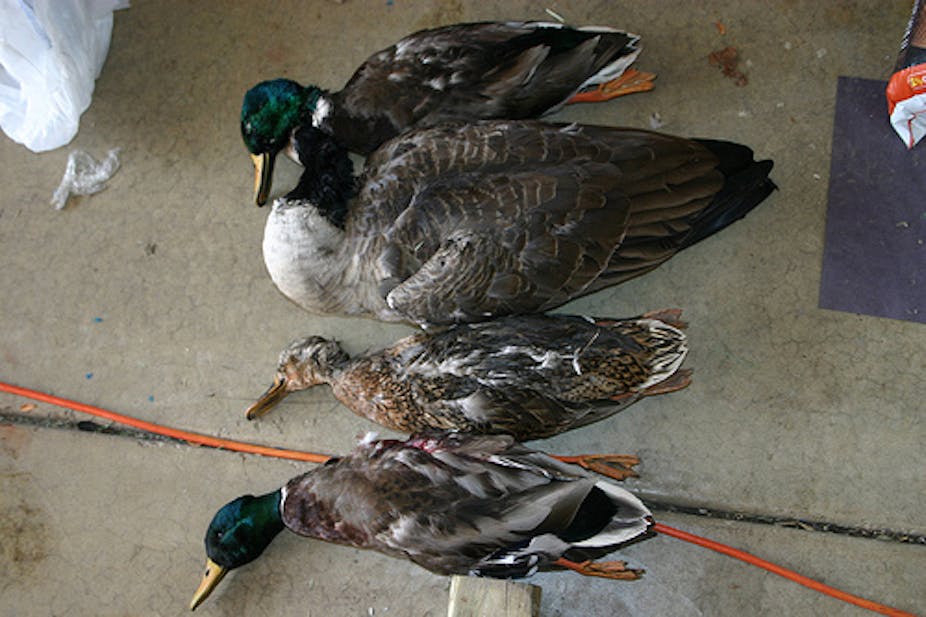Just before dawn on the third Saturday in March, the first shots will be fired, and the 2013 Victorian duck hunting session will commence. But 2013 will be unlike previous years.
You are probably unaware of this – unless you happen to read the rural press with great precision – but on September 11 the Victorian Government gazetted new hunting regulations. They disturbingly include changes to better facilitate participation in game hunting by junior hunters (aged 12-17 inclusive) and non-residents of Australia.
In short, children and international visitors who are unlikely to be able to differentiate between native and non-native animals at a distance, will be more readily armed.
Yet the changes I find most problematic are those intended to curtail the activities of duck rescuers. During previous duck hunting sessions duck rescuers were excluded from the water until after 10 am (by which time duck shooting had concluded) on the first weekend of the session (the most busy weekend of the session). Duck rescuers also had to be positioned 5 meters from the shoreline.
Under the new rules duck rescuers will be excluded from the water every single day of the duck hunting session. The ban will commence two hours before dusk, and last until 10 am the following morning. Duck rescuers must also be 25 meters back from the shoreline.

This is a terrible shame for those ducks who could be aided by voluntary veterinary service of the sort provided by the Coalition Against Duck Shooting. It is also a shame for those who believe that the community has a right to know what happens during duck hunting session.
To understand the implications of these new regulations we have to consider why duck rescuers go out on the water.
The most pressing matter from the rescuers’ perspective is to assist injured birds. The central focus of duck rescue is the provision of veterinary care to animals that are injured but capable of recovering.
In a twist to the duck rescue objective, in 2011 duck rescuer Anthony Murphy was charged with failure to kill. If a shooter hits a bird, but wounds rather than kills the animal, the shooter must retrieve the bird and “dispatch” or kill the animal. Where the shooter can’t, or doesn’t, retrieve the bird and duck rescuers are able to get to the animal, they will seek veterinary assistance. Murphy was in the process of transporting a wounded duck to a vet when he was charged. The Victorian Department of Primary Industries subsequently dropped the charges.
But duck rescuers are not only on the water to aid birds. They also collect rubbish, including the bodies of shot birds (some of which will be protected species), for the purpose of displaying the birds and shot gun cartridges outside Victoria’s Parliament House. They do this primarily for the media, but no doubt they like politicians and bureaucrats to also catch a glimpse.
The collection of rubbish is a worthwhile community service. But the annual display of dead birds is more than that. It is a means by which distant happenings are brought to the community’s attention. The display provides an opportunity for the majority of the community, who will never be out on the wetlands during duck hunting session, to consider whether the hunting laws made in their name really reflect their values. (for images of ducks outside parliament house check here or here).
Closely associated with the collection of rubbish and carcasses, duck rescuers also go out on the wetlands to bear witness to the actions of shooters, and the resulting death of birds. They do so partly to inform themselves, but also so they can communicate what they have seem to interested members of the community.

Duck rescuers are also most likely to be out there because they want to alert birds to the danger that’s around them. Duck rescuers tend to wear brightly coloured clothes and make noise. There is debate about the extent to which duck rescuers do the birds a favour when they cause a commotion. Some hold that it can be effective in shooing birds away. Others feel that the more commotion there is the more birds will take to the air and thus the more opportunity there will be to shoot them.
And finally, at least some duck rescuers are most likely out on the water because they find the practice of duck hunting offensive and they want the shooters to know that they object.
While some of the reasons duck rescuers go out on the water are more laudable than others, on balance my view is that the new exclusion rules take something important away from Victorian citizens. I don’t wish to live in a world where people who shoot birds are provided their own private environment in which to do so. That means that the animals they shoot cannot be aided and nobody can observes the practice. If duck hunters have the right to shoot them people such as Laurie Levy should have the right to watch. He knows the safety risks and is prepared to take them.
I have never been out on the water. But I’m glad Laurie Levy has. He is one of the means by which I can decide whether duck hunting is an activity I support. He acts as a democratic conduit, and excluding him from the water is a blow to my democratic rights.

